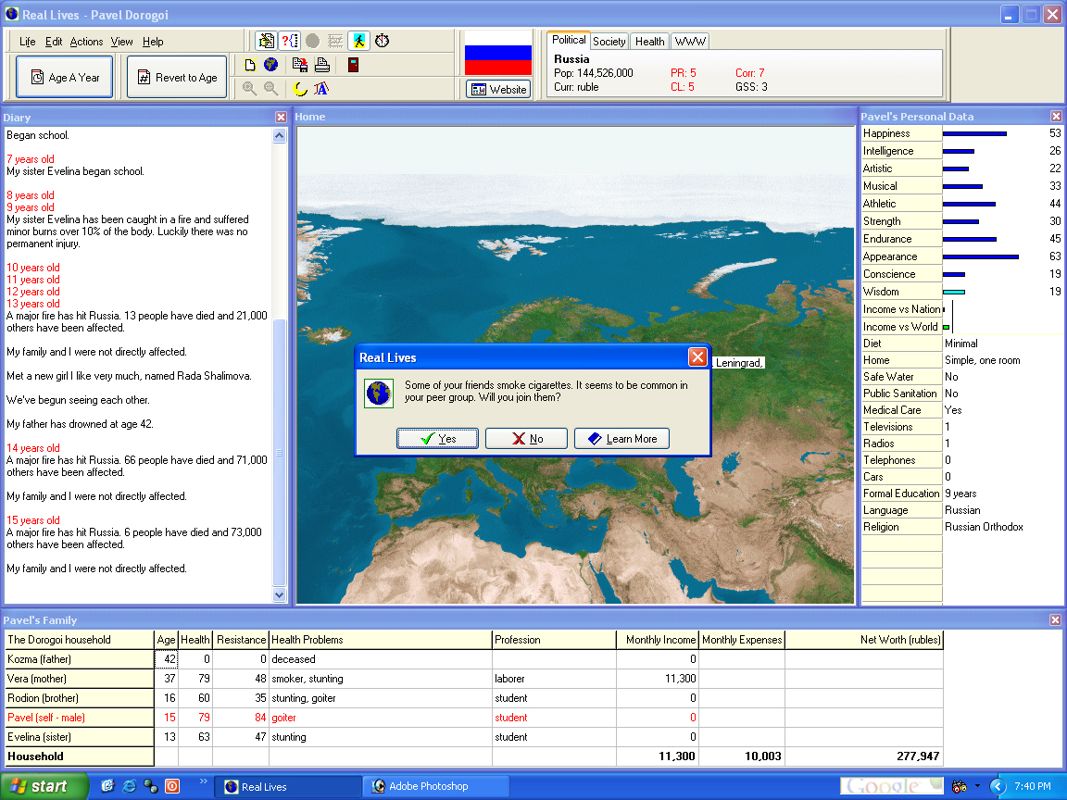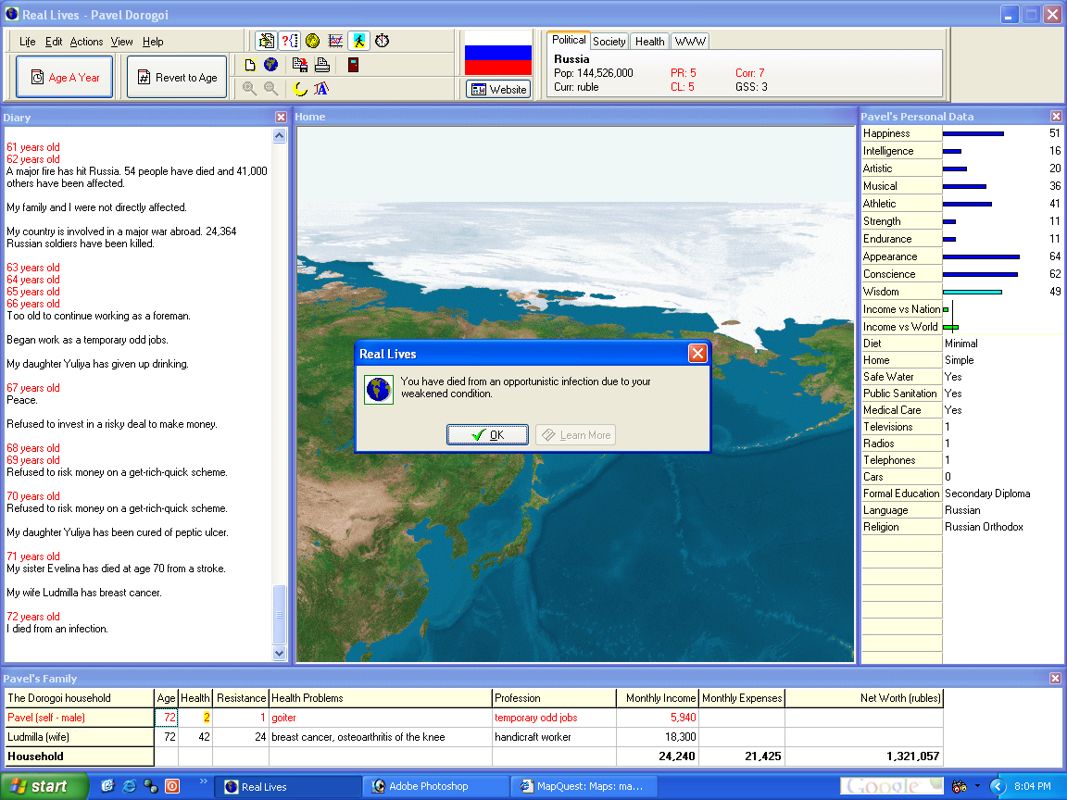Retro Replay Review
Gameplay
Real Lives delivers an immersive life-simulation experience unlike any conventional game. From the outset, you are assigned a random country, gender, name, and family background, setting the stage for a unique life journey. Every decision—ranging from whether to attend school or pursue immediate work—carries weight, reflecting real-world consequences that shape your character’s future. The moral choices you encounter, such as supporting a sibling’s education or contributing to community projects, add a compelling ethical dimension to the gameplay.
(HEY YOU!! We hope you enjoy! We try not to run ads. So basically, this is a very expensive hobby running this site. Please consider joining us for updates, forums, and more. Network w/ us to make some cash or friends while retro gaming, and you can win some free retro games for posting. Okay, carry on 👍)
One of the most engaging aspects is the character designer, which allows you to handpick your country, name, and personal attributes if you wish to explore a specific scenario. Whether you want to simulate growing up in a Scandinavian welfare state or navigating the challenges of rural Sub-Saharan Africa, the customization options put you in full control of your narrative. This flexibility turns each playthrough into an educational experiment, illuminating how geography, culture, and economics interplay in daily life.
The pacing of Real Lives is thoughtfully balanced: a complete life can be played out in one or two hours, making it easy to embark on multiple runs to compare outcomes. Periodic life events—such as job promotions, illnesses, or family milestones—are presented through concise text and data-driven feedback. Though there is minimal real-time action, the strategic planning and long-term decision-making keep you invested from infancy through old age.
Graphics
Graphically, Real Lives takes a minimalist approach, prioritizing information clarity over high-fidelity visuals. The interface relies heavily on charts, tables, and contextual pop-ups to convey your character’s health, education level, and financial status. While this may not appeal to players seeking cutting-edge 3D environments or cinematic cutscenes, it perfectly suits the game’s educational ethos by keeping the focus on facts and figures.
The world map and demographic graphs are clean and intuitive, making it easy to compare your progression with national averages or neighboring regions. Subtle iconography—such as currency symbols, health bars, and education meters—helps track crucial metrics at a glance. The overall aesthetic is functional rather than flashy, reinforcing the simulation’s goal of teaching real-life dynamics rather than showcasing visual spectacle.
Occasional background images and cultural photographs add flavor without overwhelming the interface. You might see snapshots of a rural village or a bustling city street that correspond to your chosen country, cultivating a sense of place. Though simple, these visuals serve as effective context cues, reminding you that each statistic represents real communities and individuals.
Story
Unlike narrative-driven RPGs with scripted plotlines, Real Lives crafts its story through emergent gameplay. Your life’s trajectory unfolds based on your decisions and the circumstances of your birth—political stability, economic opportunities, and social norms all factor in. Over multiple playthroughs, you’ll encounter vastly different narratives, from overcoming poverty to attaining professional success in developed nations.
Key life events—such as marriages, career breakthroughs, and health crises—are depicted through short descriptive passages that feel authentic and grounded. There is no central protagonist or villain; instead, your own character becomes the hero or heroine of a personal saga. This open-ended storytelling encourages reflection: you may end up contemplating global inequality, access to education, or the impact of cultural traditions on individual freedoms.
The moral choices scattered throughout your life story heighten the emotional stakes. Should you donate a portion of your income to charity? Will you pursue a high-status career at the cost of family time? These dilemmas are presented without judgment, allowing you to chart your own ethical course. As a result, each narrative resonates with a sense of realism and personal investment.
Overall Experience
Real Lives stands out as both a game and an educational tool. It offers a rare blend of data-driven simulation and personal storytelling, making it ideal for classrooms, social studies enthusiasts, or anyone curious about global diversity. Its short runtime per life encourages repeated exploration of different cultures and socioeconomic backgrounds, fostering empathy through interactive learning.
While it may lack the graphical polish of mainstream titles, its strength lies in its depth and authenticity. The user interface prioritizes meaningful information over flashy effects, which can be a refreshing change for players accustomed to fast-paced action. Real Lives invites you to slow down, reflect on complex issues, and appreciate how small decisions can ripple through an entire lifetime.
In sum, Real Lives offers a thought-provoking journey through human experiences across the globe. Whether you’re seeking an educational supplement, a unique simulation, or a platform for moral exploration, this game provides a rich, engaging experience. Its ability to educate while entertaining makes it a valuable addition to any gamer’s library, especially for those interested in social science and cultural studies.
 Retro Replay Retro Replay gaming reviews, news, emulation, geek stuff and more!
Retro Replay Retro Replay gaming reviews, news, emulation, geek stuff and more!









Reviews
There are no reviews yet.